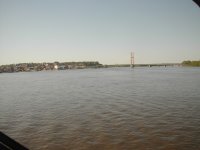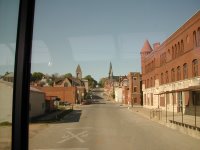 After we have travelled an hour or two out of Chicago, the train has begun to settle into its rhythm. Passengers are stretching out, reading, dozing, watching movies on portable computers or reading books. We're barreling across the agricultural flatlands of rural Illinois, much the same as the parts of Ohio and Indiana that I passed through on Saturday morning. The sun is shining, and from my comfy chair in the Sightseering Lounge, the mid-west is looking gorgeous. For me, this landscape is still unearthly. Everything is different. Even though I've lived in North America for over six months, I'm still a little islander by heart. Save for the Fens of Cambridgeshire and Norfolk, there is nowhere back home that is as flat and vast as these agricultural belts of North America.
After we have travelled an hour or two out of Chicago, the train has begun to settle into its rhythm. Passengers are stretching out, reading, dozing, watching movies on portable computers or reading books. We're barreling across the agricultural flatlands of rural Illinois, much the same as the parts of Ohio and Indiana that I passed through on Saturday morning. The sun is shining, and from my comfy chair in the Sightseering Lounge, the mid-west is looking gorgeous. For me, this landscape is still unearthly. Everything is different. Even though I've lived in North America for over six months, I'm still a little islander by heart. Save for the Fens of Cambridgeshire and Norfolk, there is nowhere back home that is as flat and vast as these agricultural belts of North America. The further west we go, the greener it gets. In the last twenty minutes or so before we cross the Mississippi, the fields thin out and the greenery suddenly gets denser. We're rolling through leafy forests, with fresh leaves sprouting on all the trees, breaking the bright sunshine that is falling through to the moist forest floor. Still bodies of water start to appear, and then almost without warning, the train slows and we rumble onto the 600 metre bridge that carries us across the Mississippi. At 3780km, I have to admit that this is one of the longest rivers I can said to have crossed at ground level. Although it's not as long as my trip will be...
The further west we go, the greener it gets. In the last twenty minutes or so before we cross the Mississippi, the fields thin out and the greenery suddenly gets denser. We're rolling through leafy forests, with fresh leaves sprouting on all the trees, breaking the bright sunshine that is falling through to the moist forest floor. Still bodies of water start to appear, and then almost without warning, the train slows and we rumble onto the 600 metre bridge that carries us across the Mississippi. At 3780km, I have to admit that this is one of the longest rivers I can said to have crossed at ground level. Although it's not as long as my trip will be...Immediately after the bridge, we pull into Burlington, Iowa. Crossing the river, we have crossed the state line and I find myself in another new state. There are many BNSF freight trains waiting here, and one is even following right behind us across the bridge. In the coming miles, we sometimes meet as many as one freight train every five minutes going in the opposite direction. It is the complete opposite of England, where there are too many passenger trains for any substantial rail freight.
 It's sunny in Burlington, IA, but the once grand turn of the century five and six story industrial buildings in the town's small centre all appear vacant. Of the few shop units I see, several have 'For Lease' signs in their windows. Small town America is hurting bad: America is so used to the automobile that small centres of population simply can't rely on local business any more. Might as well hop in the car and drive 50km to a cheaper big box store. As we cross what looks like Burlington's Main Street, not one car waits either side of the level crossing for us.
It's sunny in Burlington, IA, but the once grand turn of the century five and six story industrial buildings in the town's small centre all appear vacant. Of the few shop units I see, several have 'For Lease' signs in their windows. Small town America is hurting bad: America is so used to the automobile that small centres of population simply can't rely on local business any more. Might as well hop in the car and drive 50km to a cheaper big box store. As we cross what looks like Burlington's Main Street, not one car waits either side of the level crossing for us.About an hour or so later, we pull into Ottumwa, IA. I've spotted something out of my window, which I'm tempted to keep a secret that I will share only with my camera. So much for that rather selfish idea, when our conductor picks up the PA handset.
"Hey everyone, take a look out of the left hand side of the train; there are some beautiful hot air balloons here in Ottumwa for our entertainment."
Cue lots of oooo-ing and aaah-ing in the coach.
We have about ten minutes in Ottumwa. The smokers are outside faster than the passengers whose destination this is. The station has, to be very honest, seen much better days. There appear to have been as many as six platforms here at one time: now only one is used, and its surface is made of uneven and broken tarmac. The platform canopies are rusting and decaying in the elements.
I step away from the train to photograph the baloons, including one that appears to be a giant penguin. Something to strike fear into the hearts of at least a few toddlers today, no doubt...
*j*
1 comment:
I'm going to disagree with your conclusion about small town America "hurting bad." That's not the reason why it was so deserted. I think what it's important to remember is that it was Sunday. It's probably more accurate to say, "Small town America is CLOSED on Sunday."
Post a Comment